
Edgar Allan Poe was an American writer, poet, editor, and literary critic. Poe is best known for his poetry and short stories, particularly his tales of mystery and the macabre. He is widely regarded as a central figure of Romanticism in the United States, and of American literature. Poe was one of the country's earliest practitioners of the short story, and considered to be the inventor of the detective fiction genre, as well as a significant contributor to the emerging genre of science fiction. Poe is the first well-known American writer to earn a living through writing alone, resulting in a financially difficult life and career.

Homer is the legendary author to whom the authorship of the Iliad and the Odyssey, the two epic poems that are the foundational works of ancient Greek literature, is attributed. He is regarded as one of the greatest and most influential authors of all time. For example; in Dante Alighieri's Divine Comedy, Virgil refers to him as "Poet sovereign", king of all poets; in the preface to his translation of the Iliad, Alexander Pope acknowledges that Homer has always been considered the "greatest of poets".

Henry Wadsworth Longfellow was an American poet and educator whose works include "Paul Revere's Ride", The Song of Hiawatha, and Evangeline. He was the first American to translate Dante Alighieri's Divine Comedy and was one of the fireside poets from New England.

Joel Barlow was an American poet, and diplomat, and politician. In politics, he supported the French Revolution and was an ardent Jeffersonian republican.

Hilda Doolittle was an American poet, novelist and memoirist, usually associated with the early 20th-century avant-garde Imagist group of poets, that included the modernist poets Ezra Pound and Richard Aldington. She published under the pen name H.D., and is today regarded as a forerunner of Lesbian Poetry.
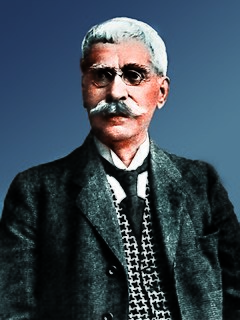
Ivan Minchov Vazov was a Bulgarian poet, novelist and playwright, often referred to as "the Patriarch of Bulgarian literature". He was born in Sopot, a town in the Rose Valley of Bulgaria. The works of Ivan Vazov reveal two historical epochs - the Bulgarian Renaissance and the Post-Liberation epoch. Ivan Vazov holds the highest honorary title of the Bulgarian Academy of Sciences - Academician. He acted as Education and People Enlightenment Minister from September 7, 1897, until January 30, 1899, representing the People's Party.

William Gilmore Simms was an American writer and politician from the American South who was a "staunch defender" of slavery. A poet, novelist, and historian, his History of South Carolina served as the definitive textbook on state history for much of the 20th century. Literary scholars consider him a major force in antebellum Southern literature; in 1845 Edgar Allan Poe pronounced him the best novelist America had ever produced. Throughout much of his literary career he served as editor of several journals and newspapers. He also served in the South Carolina House of Representatives from 1844–1846.

John Trumbull was an American poet.
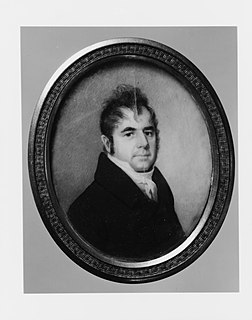
Anthony Bleecker was a lawyer and author who was a friend of Washington Irving and William Cullen Bryant.
Nationality words link to articles with information on the nation's poetry or literature.
Nationality words link to articles with information on the nation's poetry or literature.
Nationality words link to articles with information on the nation's poetry or literature.
Nationality words link to articles with information on the nation's poetry or literature.
Nationality words link to articles with information on the nation's poetry or literature.
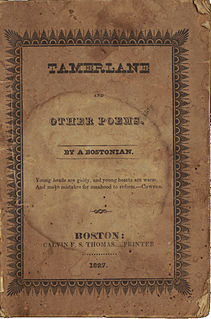
Tamerlane and Other Poems is the first published work by American writer Edgar Allan Poe. The short collection of poems was first published in 1827. Today, it is believed only 12 copies of the collection still exist.
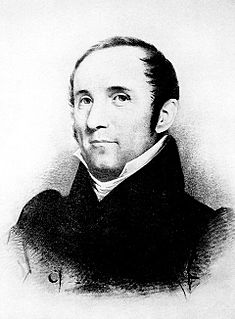
George Bomford (1780–1848) was a distinguished military officer in the United States Army and an inventor and designer of weapons and defensive installations. He served as the second Chief of Ordnance for the U.S. Army Ordnance Corps.

A Journey to Arzrum is a work of travel literature by Alexander Pushkin. It was originally written by Pushkin in 1829, partially published in 1830, reworked in 1835, and then fully published in Pushkin's journal Sovremennik in 1836.

Romanticism was an artistic, literary, and intellectual movement that originated in Europe toward the end of the 18th century. Scholars regard the publishing of William Wordsworth's and Samuel Coleridge's Lyrical Ballads in 1798 as probably the beginning of the movement, and the crowning of Queen Victoria in 1837 as its end. Romanticism arrived in other parts of the English-speaking world later; in America, it arrived around 1820.
Samuel Kettell (1800–1855) was an American author. He also wrote under the name "Sampson Short-and-fat".
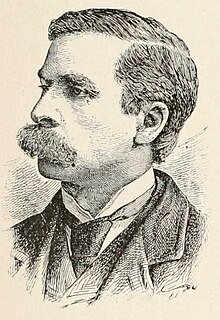
John James Piatt was an American poet.














